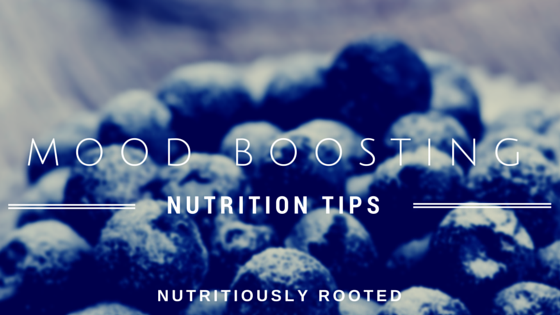HEALTHY DIET TIPS FOR MOOD SUPPORT + OVERALL HEALTH
INCREASE OMEGA-3 FAT INTAKE.
This means eating fish at least twice a week, consuming seeds on most days and supplementing with a high quality omega-3 fish oil. Some of the best sources of EPA, the type of omega 3 fat that’s been shown to improve mood are: sardines, tuna, anchovies, salmon and trout [all wild-caught, please]. Tuna, being high in mercury is best not eaten in excess to avoid mercury toxicity. EPA containing nuts and seeds include: ground flax seeds, pumpkin seeds and walnuts. Add these nuts + seeds to salads, smoothies or as a quick + healthy snack.
If eating these high-quality omega-3 fat sources on a regular basis proves to be difficult for you, a high-quality fish oil supplement is something I highly recommend. Feel free to ask me for recommendations.
Check out these recipes which are naturally a great source of omega-3’s:
Blackened Salmon
Salmon Soba Noodle Bowl
Coconut-Flax Crusted Chicken Strips
EAT YOUR B-VITAMINS.
B vitamins enhance energy and play a role in producing chemicals in the brain that support mood. The different B vitamins include: Thiamin, Riboflavin, Niacin, Folate [or folic acid], B6, B12, Biotin and Pantothenic Acid. B vitamins are widely distributed throughout the food supply, so if you’re eating a variety of foods, likely you’ll be getting plenty of B vitamins. If you’re a picky eater or are not eating a variety of whole foods on a regular basis, consider a B complex supplement.
Food sources rich in B vitamins include:
[1] whole grains
[2] beans + legumes
[3] nuts + seeds
[4] fruits + vegetables [especially leafy green veggies like kale, spinach, collards and Swiss chard]
[5] animal protein, eggs, seafood + dairy
For my vegetarians or vegans out there, B12 is only found in animal foods [meat, fish, eggs + dairy], so a B12 supplement is highly recommended in order to make sure your body gets this super important nutrient. A good starting point is also to supplement with a whole-food multivitamin providing a variety of B vitamins.
SEROTONIN AND MOOD.
Serotonin is a mood-boosting chemical [neurotransmitter] that supports your mood and helps regulate sleep. Unfortunately, many people are deficient in serotonin which can lead to depression, overall mood issues and insomnia. And B vitamins actually help build serotonin, so make sure you’re including a variety of whole foods in your diet. In addition, tryptophan [an amino acid found in protein-containing foods] is converted to serotonin in the body, so tryptophan will play an important role in mood support.
Make sure you eat enough protein from the following sources, all of which are good sources of tryptophan:
[1] beans + lentils
[2] nuts + seeds
[3] fish
[4] eggs
[5] animal protein
AVOID/REDUCE SUGAR + REFINED CARBOHYDRATES.
Eat a diet that is low in empty calories [i.e. sugar] and a diet that will stabilize your blood sugar. This means eating a balanced diet that includes whole food sources of carbohydrates [fruits, veggies, whole grains, sweet potatoes], healthy fats + protein. For a guide to healthy fats, check out this post.
The key points include:
[1] avoid added sugar including: soda, juice, sweetened lattes, processed foods, sauces, cereals, granola bars, etc.
[2] eat lower-glycemic carbohydrates from vegetables, fruit, whole grains + sweet potatoes, while avoiding refined grains like white bread, white rice, processed foods, granola bars, etc.
[3] eat a balance diet including carbs, protein + healthy fats with each meal
[4] include snacks that are lower glycemic and include protein, such as: fresh fruit with a handful of nuts or nut butter, whole-grain toast with hummus, hummus + veggies, string cheese + fruit, homemade trail mix
Check out my guide to Healthy, Whole-Food Snacks.
SUPPLEMENT WITH VITAMIN D.
Every single cell in your body has a receptor for Vitamin D which explains it’s importance in overall health, including mood support. We absorb Vitamin D best when our skin is exposed to the sun. In climates that get little sun year round [such as the Pacific Northwest], it can be important to supplement with vitamin D3 [the active form of vitamin D, not to be confused with vitamin D2]. Vitamin D is sometimes added to foods, but is found naturally in fish, liver, dairy and egg yolks. Because vitamin D is not available in many commonly consumed foods, it can be difficult for most people to get adequate amounts through food alone, which is why supplementation is often recommended.
Not sure if you’re getting all these mood-boosting nutrients in adequate amounts? A great food tracking resource that will show you your individual nutrient intake is called CRON-O-Meter. While I don’t recommend strictly tracking food intake on a regular basis, it can be nice to see what you’re eating and if you’re missing out on any of these important mood-boosting nutrients.
Here’s to supporting your mood through food! Any questions? Shoot me an email.
live happily + healthfully,
Angela
Certified Nutritionist
Foodie + Health Enthusiast





Recent Comments